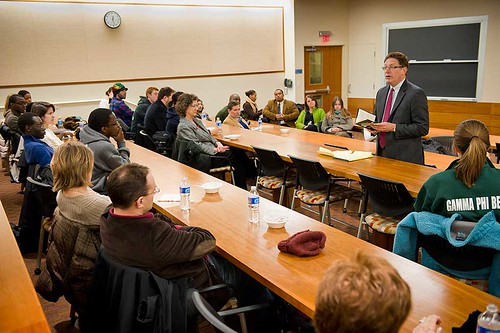 President Jeffrey Herbst shared some of his research and experiences in Africa with students and faculty during a recent lecture about foreign aid that was part of the Doing Well by Doing Good series.
President Jeffrey Herbst shared some of his research and experiences in Africa with students and faculty during a recent lecture about foreign aid that was part of the Doing Well by Doing Good series.
A past Fulbright scholar and John Simon Guggenheim Foundation fellow, as well as author of the award-winning book States and Power in Africa, Herbst highlighted some of the complications, as well as benefits, of providing foreign aid to Africa.
He noted that high levels of corruption, lack of infrastructure, the fact that monetary aid is fungible, and restrictions the West attaches all can reduce the benefits of foreign aid.
Herbst observed that aid can be used to support corruption, despite the donor’s wishes, but it also can save lives. Therefore, he argued, “good governance” is often what determines the merit of aid.
“Aid can be used well or it can be used poorly; it depends on the priorities of the government,” he told the audience members in Meyheroff Auditorium.
During his March 24 talk, Herbst also suggested that the focus of aid should be to support infrastructure improvements in African countries. Infrastructure is key for economic development, and it also is one aspect of aid that is most appreciated by the people living in those areas – though, admittedly, “not one that actors and musicians tend to promote.”
Shelly Forster ’11 said she was excited to have the opportunity to hear her president speak in a smaller environment.
“I thought President Herbst was very pragmatic in his talk,” she said. “He’s a lot more worldly than I realized. He was a very impressive and engaging speaker, and I thought it was wonderful that he spoke at an event that was so accessible to students.”
Assistant professor of economics Chad Sparber was pleased that Herbst brought up obstacles to aid that often are overlooked.
“President Herbst’s talk was great in highlighting the central role that incentives play in the efficacy of foreign aid,” Sparber said. “Economists like William Easterly are skeptical about whether aid can truly alleviate poverty in the developing world precisely because governments face weak incentives to use the funds productively by pursuing growth-promoting policies. It is important for aid advocates to be aware of this challenge, yet it is often ignored in popular media discussions.”
